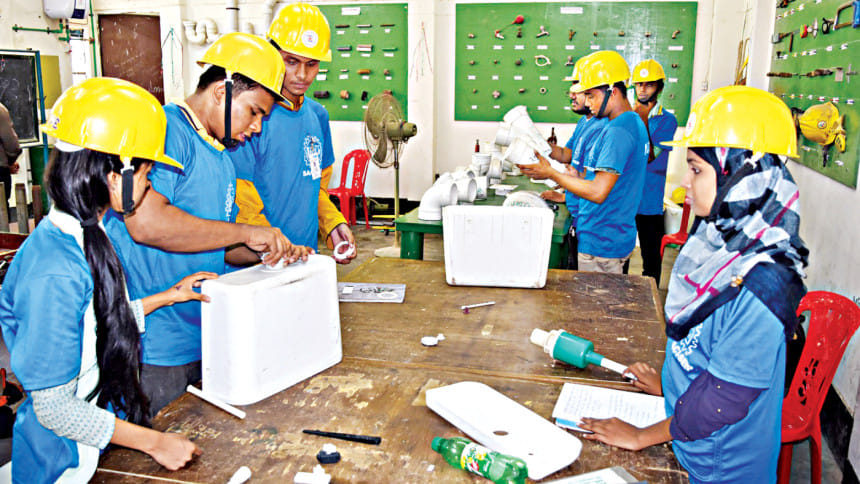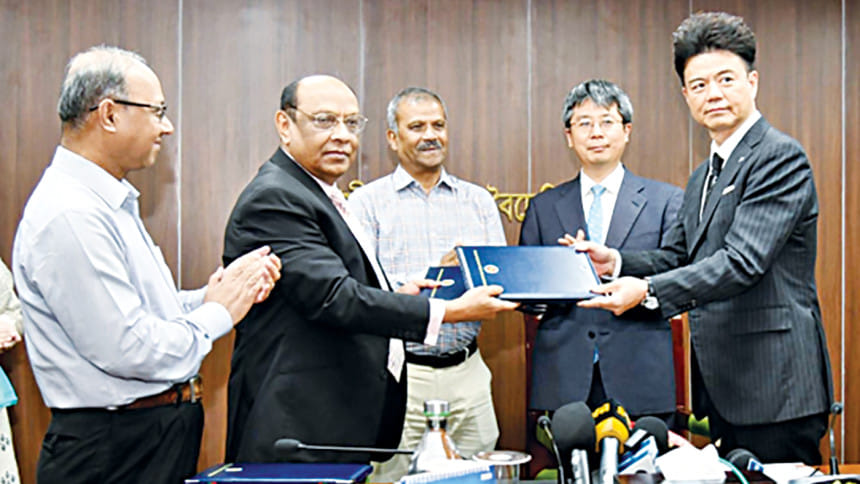As we commemorate the first anniversary of the July Mass Uprising—a powerful expression of the frustrations and aspirations of Bangladesh's youth—one core grievance that ignited that movement still demands urgent attention: the crisis of unemployment among the youth population. Today, more than one in four Bangladeshi youth remain unemployed, despite the majority of them having invested years in education. In the absence of meaningful job opportunities, many young people are turning to dangerous or illegal means of survival, destabilizing communities and undermining social cohesion. To honor the spirit of the uprising, we must urgently create new employment pathways for our youth. While this challenge demands a multi-pronged policy response, one high-impact and relatively untapped solution is expanding international migration—especially skilled migration to rapidly aging, high-income countries in Asia.
Why Skilled International Migration?
The acute labor shortages in aging societies such as Japan and South Korea have opened unprecedented opportunities for skilled migrant workers from Bangladesh. These countries—once relatively "closed" to immigration—are now actively recruiting foreign workers to sustain their economies. Japan has introduced the "Specified Skilled Worker" (SSW) visa program, allowing migrant workers in 16 sectors, including areas like nursing care, hospitality services, food services, railway industry, construction, automobile transportation, and so on. Japanese intermediaries have already begun recruiting from the Philippines, Myanmar, and Indonesia to fill this gap. Similarly, South Korea has tripled its migrant worker quota to 150,000 in 2024 alone (The Economist, August 29, 2024). These trends are set to accelerate: OECD forecasts that South Korea will need over eight times more foreign workers by 2040, and JICA estimates Japan will require 5 million additional migrant workers by that year to maintain modest economic growth. For countries like Bangladesh, these shifts present a historic opportunity to become a key supplier of skilled labor to these economies. These trends create a clear opportunity for Bangladesh—if we can equip our youth with the skills to seize it.
Bangladesh has long depended on labor migration as a lifeline for employment and remittance inflows. About 8 to 10 million Bangladeshis work in low-skilled jobs abroad—mainly in the Gulf. But these jobs often offer poor working conditions, limited labor rights, and low wages. Recent research conducted by economists at Columbia University, University of Pennsylvania, and NYU-Abu Dhabi show that even when offered job opportunities in the UAE, many Indian construction workers prefer not to take those jobs, and overall well-being does not improve much for those who do. So Bangladesh needs to "move up the value chain" in the migration sector, and shift toward skilled migration to better-paying, rights-respecting labor markets in countries like Japan and South Korea. People sometimes worry about "brain drain" when we promote skilled migration, but recent research we published in the journal Science shows that the weight of evidence shows that there is more of a "brain gain" than a brain drain when skilled workers emigrate to richer countries.
The Language Barrier and Market Failure
Despite these openings, skilled migration from Bangladesh to Japan and Korea remains negligible, especially relative to our competitors Philippines and Vietnam. The biggest bottleneck is language. Learning Japanese or Korean is what economists call a "highly specific investment" that has limited value in the domestic job market or in other markets if the migration to Japan or Korea fails. In other words, learning Japanese or Korean is risky in a way that English is not. This has resulted in a classic market failure in which our workers are understandably reluctant to make a risky investment in a skill that is not guaranteed to pay off until they pass exams administered by the Japanese government before any visa is issued.The problem of under-investment becomes more severe from a societal perspective because many of the benefits of acquiring these skills will accrue to future generations of Bangladeshi workers rather than those making the investment today. Learning Japanese today can build migration networks that reduce costs and risks for future generations. Economic theory and logic easily justify public investments in this "network good" with positive externalities. Facilitating and subsidizing such training would be in our national interest.

A Solution to the Market Failure
As researchers, we had been working with a Japanese labor intermediary who has devised a clever solution to this market failure and is already successfully implementing their model in the Philippines, Myanmar, and Indonesia. Onodera is a large conglomerate with operations in Tokyo, Hokkaido, and elsewhere, and operates many food service and restaurant-related businesses. Those businesses needed foreign workers, and after they started recruiting, they realized that there was massive market demand in Japan for a labor placement service. Hence the subsidiary named Onodera User Run (OUR) was born, offering their foreign worker recruitment services to other Japanese employers. OUR's "Straight Through" model carefully selects trainees in Davao, Philippines and other locations, and provides free Japanese language instruction, vocational training, job placement, and post-arrival support. Only after the trainee passes the required government-administered language and culture exams and upon successful placement with an employer in Japan, does OUR get reimbursed by employers for the cost of providing free training. The reimbursement amount is generous enough that OUR has been operating as a profitable business in Tokyo. They have already successfully placed thousands of workers from Southeast Asia into Japan's labor market.
From Memo to MoU: A Public-Private Partnership Takes Shape
Inspired by our experience working with OUR in the Philippines, Mushfiq Mobarak, a Yale Economics Professor and one of the authors of this piece—outlined a concrete vision in a policy memo in August 2024 and shared it with a few relevant advisors in the interim government who were newly placed in charge of the Planning Ministry and the Ministry for Expatriate Welfare. He proposed that Bangladesh set up a public-private migration facilitation program where Japanese employers co-finance training programs. After some positive responses to the memo, we asked OUR to consider expanding their operations in Bangladesh leveraging our close connection to the company. They were persuaded based on the availability of human resources in Bangladesh and enthusiastic government agencies who were willing to partner.
Shortly thereafter, OUR submitted a letter of intent addressed to Dr. Asif Nazrul expressing interest in entering the Bangladeshi market. We set up multi-party dialogues between OUR, Ministry of Expatriates' Welfare and Overseas Employment, as well as the Bureau of Manpower Employment, and Training (BMET), with the help of Mr. Zia Hassan, policy advisor to the Ministry. OUR sent a delegation from Tokyo to Dhaka, and this collaboration culminated in a Memorandum of Understanding (MoU) to initiate a pilot program in Bangladesh. OUR will soon begin training Bangladeshi youth for skilled migration to Japan, replicating their Filipino model.

Path Forward
To realize the full potential of skilled migration and ensure the success of the new public-private partnership, Bangladesh must take several strategic steps. First, the government should invest in expanding the supply of qualified trainers in Japanese and Korean languages, which are absolutely essential to successfully place migrants in these countries. At present, there is a severe shortage of high-quality language instructors, and the private sector has struggled to fill this gap. One solution could be to offer fellowships and scholarships to attract experienced trainers from Japan and South Korea to build the initial pool of instructors. In parallel, partnerships with technology platforms like Duolingo could be explored to develop AI-powered language learning tools tailored to Bangladeshi learners.
Second, public subsidies or innovative financing models should be introduced to enable young people to invest in acquiring these specialized language and vocational skills. Third, regulatory barriers must be eased to allow reputable foreign intermediaries like Onodera User Run to operate in Bangladesh, bringing in much-needed expertise, enhancing competition, reducing costs, and ensuring safer migration channels.
Fourth, the government must take steps to prevent widespread malpractice among unscrupulous migration intermediaries. Most aspiring migrants lack accurate information about job opportunities, employer conditions, skills requirements, and visa procedures. This will be especially true as we open up migration pathways to newer destinations like Japan and Korea. Ill-intentioned intermediaries exploit these information gaps to engage in fraud, charge exorbitant fees, and provide poor-quality training. To tackle this problem, the government could consider a robust quality rating system for intermediaries. This system could evaluate service providers on key metrics such as legal compliance, training quality, transparency of costs, placement outcomes, and migrant satisfaction. Regular updates, based on migrant feedback, third-party audits, and embassy-level monitoring at the destination, would enhance the quality and integrity of the rating system. Publicly available ratings would help drive out low-quality intermediaries and build trust among prospective migrants. These institutional reforms are essential not only to protect our workers but also to ensure that the entire skilled migration ecosystem remains credible, efficient, and equitable.
Finally, a nationwide awareness campaign is essential to challenge entrenched stigmas around jobs in caregiving, food service, and hospitality—sectors that are dignified, well-regulated, and respected in countries like Japan. Reframing such work as a meaningful career path for educated youth is critical. Taken together, these actions will allow Bangladesh to scale up skilled migration in a way that expands opportunity, restores dignity to our young population, and delivers on the promises of the July Uprising.
Ahmed Mushfiq Mobarak is the Jerome Kasoff '54 Professor of Economics and Management at Yale University. He can be contacted at [email protected].
Mohammad Islamul Haque is a Post-doctoral Scholar at the Yale Research Initiative on Innovation and Scale (Y-RISE).


Comments